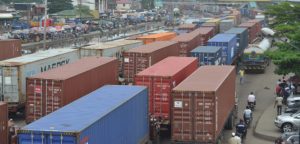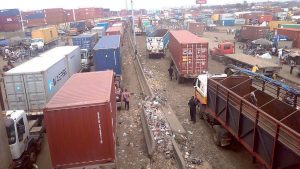Nigerian Ports Authority has declared a state of emergency on Lagos seaports and commenced diversion of vessels to alternative terminals within Lagos as well as the Eastern Ports.
Seaports concerning trade are major gateways to the economy of a country. They represent a complex structure in a country’s transportation system providing ship harbor interface services such as pilotage, dredging, provision of berths, maintenance of navigational channels, the ship-port interface in terms of loading and unloading cargoes and port-land interface in delivering cargo to and from the hinterland.
Managing Director of the NPA, Hadiza Bala Usman, said implementation has started as the directive for diversions has been issued to the terminal operators and shipping firms.
Bala Usman explained that it was in the interest of the people to prevent endless waiting to berth and discharge cargoes while accumulating costs on elongated dwell time.
“We have noted the attendant congestion as it relates to the berthing of vessels in the last one month and off-course; the issue of the closure of the land borders is a clear reason why you have more vessels calling with higher volumes”
The monopoly of Lagos Port and its Attending Issues
The NPA also revealed that beyond cargo diversion to the Eastern Ports, Terminals within Lagos that have the capacity will also be made to receive vessels.
“We held a meeting with all the terminal operators in Lagos and we are going to move vessels to other terminals irrespective of whether a vessel was meant for a particular terminal.”

Roots TV reported that though Nigeria has six seaports, only the Lagos port complex Apapa, and Tincan Island port complex both in Lagos State are operating at nearly full capacity for exportation and importation of goods, while the other ports operates less that 50% of its capacity.
The bulk of imports into the country is mostly for businesses located in the Southeast of Nigeria and southern retailers, manufacturers and producers rely on foreign markets to source their products, machinery, and raw materials.
The inefficiency at the ports made imported goods stay longer at the ports longer than necessary. The time it takes to clear at the point of destination is three or four times longer than it takes to move them from their Ports of origination. Its resultant effect meant demurrages were being incurred by importers who had to wait over a long period to have their goods cleared or to return empty containers. This led to an increase in transportation charges and the attendant rise in the prices of goods when they are eventually cleared.
Revelations by importers showed agencies of government- from Customs officers to NAFDAC staff and other government officials who were deployed to the port to make things smooth for the importers now deliberately create obstacles and artificial hiccups to extort and force the importers to pay more through bribery and arbitrary charges.
While some businesses can weather the storm, pay the bribes and tolerate the sky-high extortions at the ports to clear their goods and remain in operation, many business dreams died at the Lagos port.
State of Eastern Ports
NPA Boss, Bala Usman added that “the time vessels spend at the anchorage in Lagos cannot be justified, hence shipping companies have been given heads up till Monday January 24, 2020 to ensure vessels that has stayed in anchorage over four days would go and berth elsewhere else.

Apart from the Lagos port complex Apapa and Tincan Island port complex both in Lagos State, there is the Calabar complex in Cross River State, the Delta Port in Warri Delta State, the Rivers Port Complexes in Port Harcourt and Onne both in Rivers State which is still at the design stage. There are also numerous inland dry ports and fuel depots.
The main problem with these ports is that the river channels leading to them are too narrow to accommodate large vessels. This made shipping companies find it more convenient to take their vessels to Lagos than to the eastern ports. The ports currently have a berth depth of between 6 – 11 meters compared to the Lagos port with berth depth ranging from 9 – 13.5 meters.
Standard port berths in other West African countries like Accra, Ghana is 19 meters, Lome, Togo is 16 meters, Cameroon at 16 meters and Cotonou, the Benin Republic at 15 meters.
The situation of the eastern seaports worsened after the concession of the ports started in 2006 with the withdrawal of 30 percent incentive granted to vessel owners when the Federal Government controlled the ports.
Currently, apart from the Onne Port, most of the other ports servicing the Southeast, South-South and the Eastern flank of the North are virtually idle. The channels into these ports need to be dredged, their facilities need to be upgraded and incentives provided to enable them to take up more of the nation’s maritime business.
While the Calabar Port suffers from shallow draught, the Onne Port is contending with insecurity such as pirate attacks and sea-robbery among others and the Port Harcourt Port suffered under constant pirate attacks, which made the port unattractive for foreign shipping lines.
The plight of ports at Nigeria’s eastern and delta coastlines is also compounded by sea robbery and militancy even as some technical challenges linger. The spate of attacks has not been contained even after seizing fire with militants.
Consequently, international shipping firms have placed high-risk rating in the freight charges, a situation that has made the charges of shipments to the ports uncompetitive.
With the call for diversion of vessels to the eastern seaports, the NPA looks ill-prepared to take this decision, what will be the fate of vessels that cannot be protected at sea? Won’t congestion continue if the eastern seaports can’t take cargos over a certain depth?
